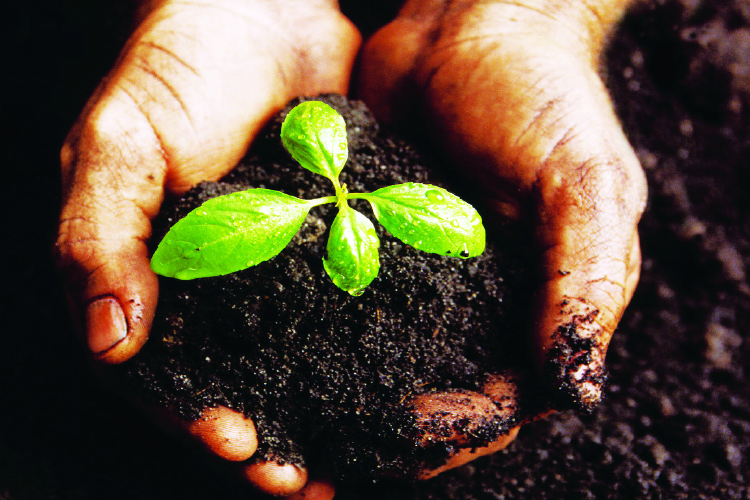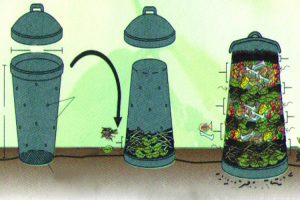It is so easy to recycle our household’s organic wastes into high quality compost for our garden. In line with today’s buzzwords ‘reuse, reduce and recycle,’ home composting can be the responsibility of every household in a progressive society.
Being a city girl all my life, I’d never even heard of the word ‘composting’ until I moved to Auckland, New Zealand with my husband in 2009. It all began when I was struggling to manage our household’s rubbish. Garbage day used to be my scariest day of the week because I’m petrified of maggots.
Since garbage collection was only once a week, the challenge was to seal and store these bags for a whole week in a hygienic manner and away from the reach of prowling animals and insects. No matter how well I sealed and stored our rubbish, I’d find these disgusting cretins squirming around the lid of the bin. Some would inevitably find their way into the bin. My husband usually takes the rubbish out but he travels a lot for work so half the time, I had to brave the task by myself. And it never got easier with time!
Table of Contents
Composting at home
One day, my husband brought home a bottomless black box with ventilation slits on all sides. He explained that it was a compost bin and how we will use it to convert organic rubbish into compost for our garden.
This compost bin changed my life for the better forever. Not only did we save money on rubbish bags (RM4.50 per bag), it minimized the maggots too as our rubbish was no longer smelly and attractive to the flies.
We chose a spot in the corner of our garden where it gets half a day of sun and dug out a small grass patch for the bin to sit on. And that was it! We were good to go.
All kiwis compost at home to a certain extent, ranging from unsightly piles in the corner of the garden to store-bought or home-made compost bins. Some households have two or more compost bins so that they can turn over the contents of their bins from top to bottom and from one bin to another to further accelerate the composting process.
DIY compost bin
You can go out and buy a brand new compost bin but they are quite costly. Or you can easily make your own bin with just a few simple tools.
- Purchase a new plastic bin or use an old existing one.
- Drill small holes around the bin.
- Cut off the bottom base of the bin.
- You are now ready to begin composting.
Starting a compost bin
- Choose a spot in the corner of the garden.
- Lay down the first layer down with dried leaves and small twigs. Do not compress this layer as it needs to be loose to allow good aeration.
- Throw in all organic wastes like fruits and vegetables cuttings on top of it.
- Layer it with dried leaves, small twigs and cut grass, alternating with the fresh wastes as shown in the diagram.
Why should we compost?
With home composting, not only did we reduce our wastes, we were rewarded with healthy compost for our very own garden. Instead of bagging or burning away the grass cuttings after mowing the lawn, just throw it into the compost bin. Even cardboard egg cartons, boxes and the cardboard roll that is left after the toilet roll is finished are destined for the compost bin. Any bits of paper that has minimal printing will assist in creating healthy compost. Aside from paper products, we also throw in empty egg shells.
Before we started to compost, we used to generate two large bags of rubbish each week. But now, we only take out one bag a week. Some weeks, the bag isn’t even full.
The composting process
Composting is nature’s way of breaking down organic wastes into an earthly soil that our garden will love. When we compost, we replicate nature’s natural system of breaking down materials on the forest floor. In every garden, forest and jungle, plants die, fall to the ground and decay. They are slowly dismantled by the small organisms living in the soil. Eventually these plant parts disappear into brown crumbly humus that keeps the soil light and fluffy.
Humus is our goal when we compost. It is highly prized as a soil conditioner, enriching the soil with nutrients and micro-organisms. The best way to use it in a garden is to mix it in well with the regular soil at 50/50 ratio and then add this mix to new or existing plants.
Every month, we would turn the contents of the bin from top to bottom to mix and aerate it. If it hasn’t been raining much, we would also water the contents of the bin to accelerate the composting process. But with humid conditions like in Malaysia, it is not necessary to water the compost pile. Powdered lime or dolomite lime is sprinkled over the contents every 6 months or so to further assist the breaking down process.
Optimizing conditions for great composting
Nature provides an extensive, native population of microorganisms that are generally attached to all organic wastes. When conditions are right, these microbes grow and multiply by decomposing the material to which they are attached. Microorganisms such as bacteria and fungi account for most of the decomposition that takes place in a pile.
They are considered chemical decomposers because they change the chemistry of organic wastes. The larger decomposers or macro-organisms in a compost pile include mites, centipedes, bugs, snails, millipedes, spiders, slugs, beetles, ants, flies, flatworms and earthworms. They are considered to be physical decomposers because they grind, bite, suck, tear and chew materials into smaller pieces. Compost is the end product of a complex feeding pattern involving hundreds of different organisms.
Four key factors in providing optimum conditions are:
- Nutrient balance – the balance of carbon to nitrogen is vital to the composting process. Dried leaves, grass cuttings and paper products are sources of carbon while nitrogen comes from fresh fruit and vegetable wastes.
- Temperature refers to the heat produced in your compost pile that occurs due to the breakdown of organic material. The higher the heat, the faster compost will be produced. High heat also destroys plant diseases and weed seeds in the pile.
- Aeration is a key element in composting. Proper aeration is needed for the biological processes to thrive with optimum efficiency. That is why all compost bins have ventilation slits or holes on the sides. Turning the contents of the compost bin every couple of months is also important so that different parts of the content are exposed to air and not rotting away, producing foul odours.
- Moisture content of compost should ideally be from 55 to 70 percent. When there’s too much moisture, there will be less aeration. But if the moisture content decreases below 50 percent, the rate of decomposition also decreases rapidly. Malaysians are lucky because we don’t have to worry about moisture problems in our climate. As a rule of thumb, a mixture of organic wastes should feel damp to the touch but is not soggy.
By providing the optimum conditions, we speed up the composting process and also produce the highest quality compost possible.
A matter of getting used to
It took me a while to get used to idea of compartmentalizing our rubbish. I’d sometimes accidently throw out vegetable cuttings by mistake and then have to dig it out of the rubbish bin later. In Auckland, we also recycle plastic, glass and aluminium wastes so I have had to create different holding areas in my kitchen for the various recyclable wastes.
After some time, my mind became so tuned to composting and recycling that I now automatically put the fresh cuttings aside in a holding container while plastics and glass bottles go straight into another box. My husband’s empty beer cans go into that same box.
There is every reason to compost if you live in a house. Think of the satisfaction in doing your small part to save the environment. Boast to friends and family that you’re now an environmentally friendly person. And if you don’t have a garden, you can give your compost away to a neighbour or friend in exchange for the fruits and vegetables you are helping them grow. Happy composting!

















